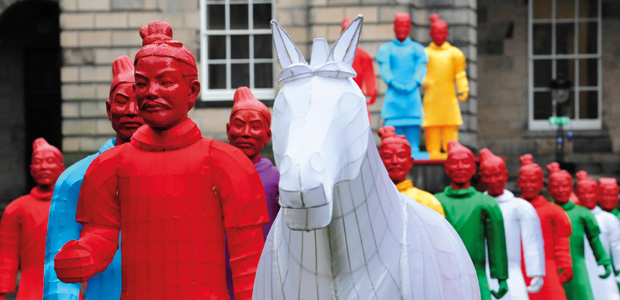
Source: Corbis
Edinburgh has been a global brand since the 16th century and continues to lead the internationalisation agenda today, argues Sir Timothy O’Shea.
In an age of mission statements and strategic plans, there are now few universities that do not profess or aspire in their literature to be “global”. A strong internationalisation agenda and outlook is essential for higher education institutions if they are to thrive in what is a truly global (and increasingly competitive) market. Yet developing a well-respected worldwide brand and reputation, and the credibility that comes with it, does not happen overnight. If the trend for universities to internationalise en masse is a relatively recent phenomenon, then inevitably some will stand out from the crowd more than others. Those institutions that have invested time and effort in this regard – in some cases over a period of several centuries – have a distinct advantage.
I can speak only for my institution, the University of Edinburgh, but I am pleased that, in my view, we fall into this category. It is a bold claim, but I can make it with conviction because it is true – and that is thanks largely to the foresight of my predecessors.
Edinburgh has been developing its global brand since its creation in 1583. Proud to be both Scottish and British, it has always been proudly international, too. When royal funding was provided in the university’s early days to appoint four new professors – or “regents” as they were known – they were hired not from the British Isles but from continental Europe. The university was modelled in part on European institutions such as Leiden University in the Netherlands and the Collège de France in Paris, one of the reasons being that Edinburgh wanted to attract students and scholars from overseas.
The university was at the centre of the 18th-century Scottish Enlightenment and its growing reputation attracted intellectual heavyweights such as Voltaire and visionaries from the 13 Colonies such as Benjamin Franklin (who visited twice before the War of Independence). Indeed, Franklin’s endorsement of the institution led to its becoming particularly popular with American students – so much so that even in his day, some 10 per cent of our students hailed from the US (including signatories to the Declaration of Independence). A number of fledgling seats of learning in the New World took inspiration from Edinburgh as a model, including McGill University in Canada and the University of Pennsylvania in the US. In 1855, Edinburgh became the first Western university to boast a Chinese graduate and by the end of the 19th century it had one of the largest cohorts of Indian students in Europe.
Today we continue to build on this pioneering tradition, but it is not easy staying one step ahead. We have the advantage of being based in the historic city of Edinburgh with its world-renowned festival (always a powerful draw for prospective students and staff). But we still need to invest considerable time and money in developing overseas relationships – and this means being prepared to take risks and deflect criticism.
Take our relationship with China, for example: we established an office in Beijing in 2005 and were the first university in Scotland to host a Confucius Institute. In an age when some commentators are calling into question the nature of UK university relationships with Chinese institutions, we are proud to promote ours. The China office has been enormously successful in helping us develop partnerships in the region and break down cultural barriers, and the Confucius Institute does the same, asking probing questions where necessary while at the same time increasing understanding between our cultures.
Since establishing the office we have opened similar operations in India, Brazil and North America, and have appointed deans with responsibility for significant global regions. Our regional offices are often at the heart of developing extensive international partnerships with key institutions that focus on creating innovative programmes, strong research collaborations and increased student and staff mobility.
We cannot be a global institution without engaging with emerging economies and encouraging our students and staff to do the same. That is why we are committed to helping more of our students to study abroad and further developing our “area studies”, offering everything from African and Scandinavian studies to Islamic and Middle Eastern studies. In this age of global unrest and uncertainty, our work in this field is more important than ever: universities have a vital role to play in reaching out across borders and building bridges as part of their internationalisation activity.
Sir Timothy O’Shea
Principal and vice-chancellor, University of Edinburgh
Register to continue
Why register?
- Registration is free and only takes a moment
- Once registered, you can read 3 articles a month
- Sign up for our newsletter
Subscribe
Or subscribe for unlimited access to:
- Unlimited access to news, views, insights & reviews
- Digital editions
- Digital access to THE’s university and college rankings analysis
Already registered or a current subscriber?